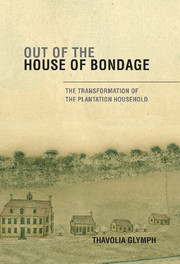Book contents
- Frontmatter
- Contents
- Acknowledgments
- Abbreviations
- Introduction
- 1 The Gender of Violence
- 2 “Beyond the Limits of Decency”
- 3 Making “Better Girls”
- 4 “Nothing but Deception in Them”
- 5 Out of the House of Bondage
- 6 “A Makeshift Kind of Life”
- 7 “Wild Notions of Right and Wrong”
- Epilogue
- Bibliography
- Index
- References
5 - Out of the House of Bondage
A Sundering of Ties, 1865–1866
Published online by Cambridge University Press: 05 June 2012
- Frontmatter
- Contents
- Acknowledgments
- Abbreviations
- Introduction
- 1 The Gender of Violence
- 2 “Beyond the Limits of Decency”
- 3 Making “Better Girls”
- 4 “Nothing but Deception in Them”
- 5 Out of the House of Bondage
- 6 “A Makeshift Kind of Life”
- 7 “Wild Notions of Right and Wrong”
- Epilogue
- Bibliography
- Index
- References
Summary
Sacrificed for nothing!
Emma Le Conte, ex-mistressIt was the fourth day of June in 1865 I begins to live…
Katie Rowe, ex-slaveThe word home has died upon my lips.
Mary Jones, ex-mistress…the conduct of the Negro in the late crisis of our affairs, convinced me that we have all been laboring under a delusion. Good masters and bad masters, all alike, shared the same fate – the sea of Revolution confounded good and evil.…I believed for a season that these people were content, happy, and attached to their master. I have lived to change all these opinions.
Augustin L. Taveau, ex-masterAt the end of March 1865, with the war closing in, a group of female slaves left their chores to take a ride in their mistress's carriage. When they returned, their mistress whipped one of them, Laurie, and sent her away with instructions never to return to the yard. Two days later, Laurie, her mother, and her sister took four oxen and an ox cart, piled their belongings into the cart, and left. A party sent after them found them still on the road, dumped their belongings from the cart, and left the women where they stood. The path to freedom was never straightforward, but freedwomen were determined to take it. Laurie no longer had to put up with beatings from her mistress. Her mother no longer had to witness them silently or impotently.
- Type
- Chapter
- Information
- Out of the House of BondageThe Transformation of the Plantation Household, pp. 137 - 166Publisher: Cambridge University PressPrint publication year: 2003



